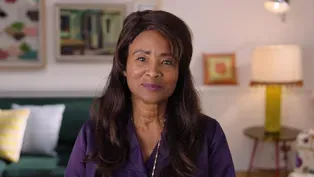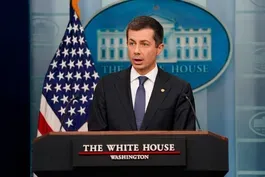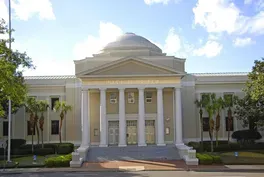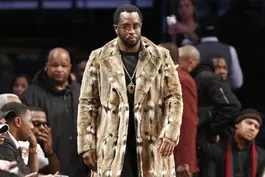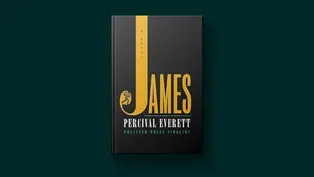
New book explores evolving role of America's First Ladies
Clip: 4/2/2024 | 6m 23sVideo has Closed Captions
New book explores the evolving role of America's First Ladies
Part policy messenger, part campaign whisperer, part style icon. Expectations of America's First Lady shift with each administration. In her new book, "American Woman The Transformation of the Modern First Lady from Hillary Clinton to Jill Biden," Katie Rogers explores how each wife has brought something unique to this ever-changing role. Laura Barrón-López sat down with Rogers to discuss more.
Problems with Closed Captions? Closed Captioning Feedback
Problems with Closed Captions? Closed Captioning Feedback
Major corporate funding for the PBS News Hour is provided by BDO, BNSF, Consumer Cellular, American Cruise Lines, and Raymond James. Funding for the PBS NewsHour Weekend is provided by...

New book explores evolving role of America's First Ladies
Clip: 4/2/2024 | 6m 23sVideo has Closed Captions
Part policy messenger, part campaign whisperer, part style icon. Expectations of America's First Lady shift with each administration. In her new book, "American Woman The Transformation of the Modern First Lady from Hillary Clinton to Jill Biden," Katie Rogers explores how each wife has brought something unique to this ever-changing role. Laura Barrón-López sat down with Rogers to discuss more.
Problems with Closed Captions? Closed Captioning Feedback
How to Watch PBS News Hour
PBS News Hour is available to stream on pbs.org and the free PBS App, available on iPhone, Apple TV, Android TV, Android smartphones, Amazon Fire TV, Amazon Fire Tablet, Roku, Samsung Smart TV, and Vizio.
Providing Support for PBS.org
Learn Moreabout PBS online sponsorshipAMNA NAWAZ: The first lady of the United States is often studied with a mixture of fascination and scrutiny.
GEOFF BENNETT: Laura Barron-Lopez has more on a new book that looks at the modern age of the role.
LAURA BARRON-LOPEZ: Part policy messenger, part campaign whisperer, part style icon, expectations of America's first lady shape shift with each administration.
In her new book, "American Woman: The Transformation of the Modern First Lady, from Hillary Clinton to Jill Biden," New York Times correspondent Katie Rogers explores how each wife has brought something unique to this ever-changing role.
Katie, thank you so much for joining us.
I want to start with your inspiration for this book.
You mentioned that you have been fascinated with the role of the first lady for years now.
Why write this?
Where did it come from?
KATIE ROGERS, Author, "American Woman: The Transformation of the Modern First Lady, from Hillary Clinton to Jill Biden": I went to school in Chicago, and the birth of my interest in first ladies grew from covering an exhibit at the Field Museum about Jacqueline Kennedy and how she used style to further American diplomacy abroad.
She spoke French, and she convinced the French to send over the Mona Lisa across the Atlantic so Americans could see it, and I thought that was a really incredible thing for anybody to do in an administration, let alone the first lady.
So I began covering the Trump White House during the Trump inauguration, essentially.
i got moved down from the New York newsroom.
And I gravitated toward Melania Trump pretty immediately because there was so much about her I think that the public really didn't know, and there was so much about her that she wasn't willing to let the public know.
So she was a really interesting figure to cover as a White House beat reporter.
Flash forward to the beginning of the Biden administration.
I was approached with an idea to do a Jill Biden book, as I had been approached before to do Melania Trump books, and I thought I would like to actually place them in sort of a lineup of women who've had this role since the turn of the century.
LAURA BARRON-LOPEZ: As you go across these first ladies in modern history, you write that the first lady's behavior is expected to -- quote -- "fit every prism of our kaleidoscope of expectations of American womanhood."
How do you find that the role of the first lady, particularly in the last 30 years, has changed?
KATIE ROGERS: They have all sort of struggled with this idea of whether they should work.
Hillary Clinton told me even she said, "I considered it briefly, and then I quickly set it aside."
She had a legal career.
Michelle Obama briefly considered trying to work, but put that aside in service of adjusting her two daughters to Washington and making sure her husband had the best chance he could at winning.
And Jill Biden is really the first one to successfully say, like, I really want to keep this part of my identity.
So I think that is a key way the role has changed, where this is becoming now a normal conversation, rather than expecting them to sort of give away this chunk of their identity.
LAURA BARRON-LOPEZ: When you write about Jill Biden, you say that her story is modern.
Why do you say that?
And, also, how does she compare to the others that came before her?
KATIE ROGERS: Her story is modern because, A, to know anything about the Bidens, you know how Jill Biden came to be in public life.
He was elected to the Senate and lost his wife shortly after in a car accident and his infant daughter.
So, really, one of the key questions I had about Jill Biden is, who would come in and try to knit this family back together?
That is modern, to have a nontraditional family.
And that's something that a lot of Americans can relate to, and it's not always something we see with first families.
Living in a family where the North Star is Joe Biden, and there's always a new campaign, and there's always a new ambition, to hold on to that as a ballast was really interesting and modern.
And I think anybody in a relationship struggles to kind of figure out the dynamic, the power dynamic there.
Even Melania Trump, I think, there were questions about, would she do enough with her policy platform?
Was she supportive of her husband enough?
Did she not move to Washington early enough?
All of these women have to sort of make these trade-offs and be a political spouse, at the end of the day.
That's -- they're not housewives.
They're partners and advisers to the most powerful person on the planet.
LAURA BARRON-LOPEZ: You explore this idea of the different powers that first ladies can have, whether it's a campaigner like Jill Biden, but also diplomacy, like you mentioned with Jacqueline Kennedy.
But when you're looking at these modern first ladies, how has the role been used to the president's advantage?
KATIE ROGERS: First of all, these women can go places the president can't easily.
So, before President Biden was able to get to Ukraine, Jill Biden secretly went into Ukraine to meet with Olena Zelenska, the first lady of Ukraine, to offer America's support and a promise that we were going to stand by them.
And even during the pandemic, she was the one who was going to Southern states, to deep red states, going to colleges and medical centers and holding people's hands while they got the vaccines.
It's a powerful messaging role that can work and function on behalf of the West Wing.
And it's as valuable as any other principal, if it's used correctly or used effectively, I should say.
LAURA BARRON-LOPEZ: When you conducted all of the interviews that you did for this book, which first lady surprised you the most out of the five that you write about?
KATIE ROGERS: Yes.
Well, what's interesting is, I didn't get to interview her.
Laura Bush doesn't do many interviews, so I tried, but I would have loved to interview her because the Bushes were in office when I was a teenager, and 9/11 happened when I was in high school.
Emotions were very high about the wars we were engaged in.
And it was all about him.
So, as a journalist, returning to her really and exploring her tenure and her presence as first lady was super fascinating.
Their advisers told me she's really the one who was there to remind him where he came from.
She was never somebody who wanted to be a policy heavy-hitter.
She was there to sort of help her husband in any way she could, but she also became a wartime first lady overnight.
And she took over the president's radio address, and she took over an initiative to support Afghan women and girls.
She launched the National Book Festival, which is still around.
So she was really a productive first lady, even though I think at the time people thought of her as more of a helpmate or just a housewife kind of presence.
She was super fascinating.
LAURA BARRON-LOPEZ: Katie Rogers, this is a fascinating book.
Thank you so much for your time.
KATIE ROGERS: Thank you for having me.
Anera pauses Gaza aid after Israeli strike on WCK workers
Video has Closed Captions
Head of Anera discusses pausing Gaza aid operation after Israeli strike kills WCK workers (6m 4s)
A Brief But Spectacular take on inspiring a love of learning
Video has Closed Captions
A Brief But Spectacular take on inspiring a love of learning (3m 13s)
Buttigieg on federal role in rebuilding Baltimore bridge
Video has Closed Captions
Buttigieg: 'We will tear down bureaucratic barriers' to rebuild Baltimore bridge (8m 23s)
Florida Supreme Court clears way for 6-week abortion ban
Video has Closed Captions
Florida Supreme Court clears way for 6-week abortion ban, but voters will decide issue (5m 20s)
Israeli strike killing 7 WCK aid workers sparks outrage
Video has Closed Captions
Israeli strike killing 7 World Central Kitchen members sparks international outrage (4m 15s)
A look at the investigations surrounding Sean "Diddy" Combs
Video has Closed Captions
A look at the sex trafficking investigations surrounding music mogul Sean "Diddy" Combs (5m 42s)
Novel retells ‘Huckleberry Finn’ from Jim's point of view
Video has Closed Captions
Percival Everett on his novel retelling ‘Huckleberry Finn’ from Jim's point of view (7m 28s)
Providing Support for PBS.org
Learn Moreabout PBS online sponsorshipSupport for PBS provided by:
Major corporate funding for the PBS News Hour is provided by BDO, BNSF, Consumer Cellular, American Cruise Lines, and Raymond James. Funding for the PBS NewsHour Weekend is provided by...

